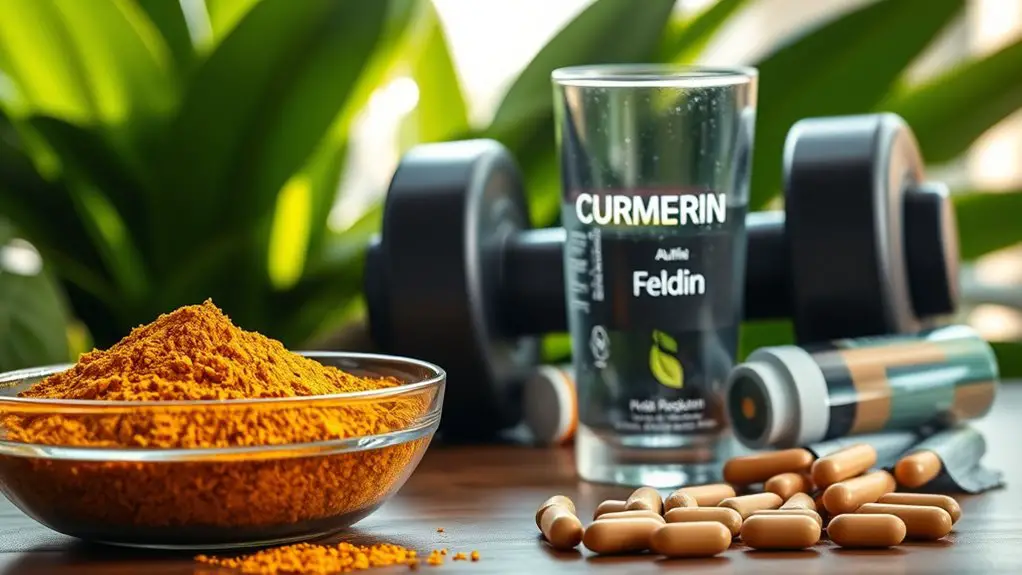The Best Supplements for Joint Health in Strength Training

To support your joint health during strength training, consider supplements like glucosamine and chondroitin, which aid cartilage repair and reduce pain. Omega-3 fatty acids can minimize inflammation, while collagen improves joint structure. MSM alleviates discomfort, and hyaluronic acid enhances lubrication. Together, these can boost performance and reduce injury risk. To optimize your regimen and explore additional options, you might find it helpful to look into more specific details about these supplements.
Understanding Joint Health and Its Importance in Strength Training

When you engage in strength training, it’s vital to understand the role of joint health, as your joints bear the brunt of the physical demands you place on your body. Maintaining peak joint mobility is essential for preventing injuries and enhancing your performance. Well-functioning joints allow for a greater range of motion, which translates to better lifting techniques and improved strength gains.
Incorporating exercises that promote joint stability and flexibility can greatly benefit your training regimen. For instance, incorporating dynamic stretches and mobility drills into your warm-up routine prepares your joints for the workload ahead. Additionally, focusing on proper form and gradually increasing weights can help prevent undue stress on your joints.
Ultimately, prioritizing joint health not only supports your strength training goals but also contributes to your overall well-being. By taking these precautions, you can guarantee a successful and sustainable fitness journey.
Glucosamine: A Key Player in Joint Support
Maintaining joint health goes beyond just exercise; it also involves nutritional support, and glucosamine is a key player in this area. This supplement has gained attention for its potential to promote joint health, especially for those engaged in strength training.
Here are some glucosamine benefits you should know:
- Reduces joint pain and inflammation
- Supports cartilage repair and maintenance
- Enhances mobility and flexibility
- May slow down the progression of osteoarthritis
You can find glucosamine in various sources, including shellfish, which are a natural source, and as a dietary supplement in capsule or powder form. Incorporating glucosamine into your routine can help guarantee your joints remain healthy and functional, allowing you to train effectively. While individual results may vary, many strength trainers report improved joint comfort and performance after consistent use. Always consult with a healthcare professional before starting any new supplement regimen.
Chondroitin: Enhancing Cartilage Health

Chondroitin is another important supplement that can play a significant role in enhancing cartilage health, especially for those engaged in strength training. Its primary benefit lies in its ability to help maintain the elasticity and resilience of cartilage, which can be essential when you’re lifting heavy weights. Research suggests that chondroitin may also reduce joint pain and improve overall function, making your workouts more effective and enjoyable.
You can find chondroitin in various sources, including animal cartilage, such as shark or bovine cartilage, and in some dietary supplements. When considering chondroitin supplements, look for those that are combined with glucosamine for added benefits. Taking these supplements consistently can support your joints, helping you maintain your training regimen and reduce the risk of injuries. Prioritize your cartilage health, and you’ll likely notice improved mobility and performance in your strength training activities.
Omega-3 Fatty Acids: Reducing Inflammation for Better Mobility
Although many factors contribute to joint health, omega-3 fatty acids have gained attention for their powerful anti-inflammatory properties, which can greatly enhance mobility for those involved in strength training. By incorporating omega-3s into your diet, you can effectively support inflammation reduction, leading to improved joint function and exercise performance.
Here are some key benefits of omega-3 fatty acids:
- Supports joint lubrication: Helps maintain synovial fluid, reducing stiffness.
- Enhances recovery: Aids in muscle repair after intense workouts.
- Improves flexibility: Contributes to better range of motion in joints.
- Boosts overall health: Supports heart and brain function alongside joint benefits.
Great omega-3 sources include fatty fish like salmon and mackerel, flaxseeds, chia seeds, and walnuts. Regularly including these in your diet can help you achieve ideal joint health and keep you moving smoothly through your strength training regimen.
Curcumin: The Anti-Inflammatory Powerhouse

In addition to omega-3 fatty acids, curcumin has emerged as another powerful ally for joint health, particularly for those engaged in strength training. This active compound found in turmeric boasts significant anti-inflammatory properties, making it beneficial for reducing joint pain and stiffness. Research shows that curcumin can inhibit inflammatory markers, helping you recover faster after intense workouts.
For peak curcumin benefits, consider a dosage of 500 to 1,000 mg per day, ideally combined with black pepper extract to enhance absorption. Many athletes have found that incorporating this supplement into their regimen not only supports joint health but also contributes to overall well-being. As you pursue your strength training goals, adding curcumin to your routine could be a game-changer in maintaining joint flexibility and minimizing discomfort. Always consult a healthcare professional before starting any new supplement to verify it aligns with your individual needs.
Collagen: Supporting Joint Structure and Integrity
Collagen plays an essential role in maintaining joint structure and integrity, making it a key supplement for anyone engaged in strength training. By understanding the benefits of collagen supplementation, as well as the various types and recommended dosages, you can better support your joint health. Let’s explore how incorporating collagen into your routine can enhance your performance and recovery.
Benefits of Collagen Supplementation
While many athletes focus on protein and carbohydrates to enhance performance, collagen supplementation has gained attention for its role in supporting joint health. Collagen, particularly types I and II, is essential for maintaining joint structure and integrity. By incorporating collagen into your regimen, you can experience notable benefits, including:
- Reduced joint pain and discomfort
- Enhanced cartilage and tendon repair
- Improved flexibility and mobility
- Increased overall joint strength
Research suggests that collagen benefits athletes by fostering recovery and preventing injuries. As you engage in strength training, consider adding collagen supplements to your diet for ideal joint support. This strategic approach can keep you moving efficiently and safely, allowing you to focus on achieving your fitness goals without the hindrance of joint issues.
Types of Collagen Sources
When considering collagen sources for joint health, it is crucial to understand the different types available and their respective benefits. Bovine collagen, derived from cows, is rich in type I and III collagen, which supports the structure of cartilage and tendons. It’s often praised for its ability to enhance joint function and reduce discomfort associated with strength training. On the other hand, marine collagen, sourced from fish, contains a higher concentration of type I collagen, making it easily absorbed by the body. This type is particularly effective for promoting skin elasticity and may also aid in joint repair. Both sources offer unique benefits, so choosing based on your specific needs and dietary preferences can help maximize joint health in your strength training routine.
Recommended Dosage Guidelines
Choosing the right collagen source is just the first step; understanding the recommended dosage can greatly impact its effectiveness for joint health. Here are some guidelines to reflect on:
- Standard dosage: Aim for 10 grams of collagen daily.
- Timing strategies: Consuming collagen post-workout can enhance absorption.
- Consistency is key: Regular intake over at least 8 weeks shows significant benefits.
- Consult professionals: Always check with a healthcare provider for personalized advice.
Research indicates that following these recommended dosages can support joint structure and integrity. Remember, while collagen can be beneficial, it’s most effective when part of a thorough joint health plan that includes proper nutrition and strength training.
MSM (Methylsulfonylmethane): Alleviating Pain and Discomfort
As many strength trainers know, joint pain can be a significant barrier to achieving fitness goals. Methylsulfonylmethane (MSM) is a naturally occurring compound that may help alleviate this discomfort. Research indicates that MSM benefits include reducing inflammation and improving joint function, making it a popular choice among athletes.
Here’s a quick overview of MSM:
| MSM Benefits | Recommended Dosage | Considerations |
|---|---|---|
| Reduces joint pain | 1,500 to 6,000 mg/day | Consult a healthcare provider |
| Decreases inflammation | Start at 1,500 mg/day | Gradually increase if needed |
| Enhances recovery | Split doses throughout the day | Monitor for side effects |
| Supports overall joint health | Best taken with food | Maintain adequate hydration |
Incorporating MSM into your routine could lead to improved performance and comfort during training sessions. Just remember to stick to recommended MSM dosage guidelines for peak results.
Hyaluronic Acid: Keeping Joints Lubricated and Flexible

Hyaluronic acid plays an essential role in keeping your joints lubricated, which can enhance your overall mobility during strength training. Not only does it help maintain joint flexibility, but it also supports cartilage health, potentially reducing the risk of injury. To reap its benefits, it’s important to know where to find it and the right dosage to take.
Role in Joint Lubrication
While many people focus on strength and endurance in their training routines, it’s essential not to overlook the importance of joint health, particularly when it comes to lubrication. Hyaluronic acid plays an important role in maintaining joint function by enhancing lubrication mechanisms. This helps reduce friction during movement and protects cartilage from wear and tear.
Here are some reasons to evaluate hyaluronic acid for your joint health:
- Supports healthy joint fluid levels
- Reduces joint stiffness
- Enhances shock absorption
- Aids recovery from intense workouts
Incorporating hyaluronic acid into your routine can greatly improve your joint lubrication, ensuring you stay active and perform at your best without discomfort.
Benefits for Flexibility
Maintaining joint lubrication is just one aspect of joint health; flexibility is equally important for peak performance in strength training. Hyaluronic acid plays an essential role in keeping your joints flexible, allowing for a broader range of motion. This is significant, especially when you’re incorporating dynamic stretching and mobility exercises into your routine. Research shows that sufficient hyaluronic acid levels can enhance joint elasticity and reduce stiffness, promoting overall flexibility. By ensuring your joints are well-lubricated and resilient, you’ll improve your performance and decrease the risk of injuries. Incorporating hyaluronic acid alongside regular mobility exercises can lead to more effective warm-ups, better recovery, and ultimately, improved strength training outcomes. Prioritizing flexibility aids in achieving your fitness goals efficiently.
Sources and Dosage
When it comes to ensuring adequate hyaluronic acid levels for joint health, there are several effective sources and recommended dosages to take into account. Here are some key points to reflect on:
- Natural food sources: Bone broth, leafy greens, and sweet potatoes.
- Supplements: Contemplate hyaluronic acid capsules or powders.
- Dosage: Aim for 100-200 mg daily, but consult your healthcare provider.
- Supplementation timing: Taking it before workouts may enhance joint lubrication during exercise.
Incorporating these sources into your diet can help maintain joint flexibility and alleviate discomfort. Always prioritize natural food sources first, but supplementation can be beneficial, especially for those engaged in rigorous strength training.
Frequently Asked Questions
Can Supplements Replace Proper Nutrition for Joint Health?
Supplements can’t fully replace proper nutrition for joint health. While they may provide essential nutrients, your body absorbs them more effectively from dietary sources. Whole foods offer a range of vitamins, minerals, and antioxidants that work synergistically, enhancing nutrient absorption. Relying solely on supplements might lead to deficiencies or imbalances. To support joint health, focus on a balanced diet rich in fruits, vegetables, whole grains, and healthy fats, complemented by targeted supplements if needed.
How Long Does It Take to See Results From Joint Supplements?
Research shows that nearly 30% of adults experience joint pain at some point in their lives. When it comes to joint supplements, you might start feeling improvements in about four to six weeks, but it can vary based on the type of supplement and your individual body. For best results, consider supplement timing; taking them consistently with meals can enhance absorption, helping you get the relief you need sooner.
Are There Side Effects Associated With Joint Health Supplements?
Yes, there can be side effects associated with joint health supplements. Common side effects might include stomach upset, diarrhea, or allergic reactions, depending on specific ingredients like glucosamine or chondroitin. It’s important to consult with a healthcare professional before starting any supplement regimen to guarantee they’re safe for you and to discuss potential interactions with other medications. Monitoring your body’s response can help you identify any adverse effects early on.
Can I Take Multiple Joint Supplements at Once?
Sure, you could mix and match joint supplements like they’re your favorite smoothie ingredients—just don’t be surprised if your body throws a fit! Combining supplements can lead to unexpected supplement interactions, which might not be the best for your health. It’s wise to consult a healthcare professional beforehand. They can help you navigate the complex world of joint health without turning your body into a chemistry experiment gone wrong.
Is There an Age Limit for Starting Joint Health Supplements?
There isn’t a strict age limit for starting joint health supplements, but age considerations are important. Many people begin in their 30s or 40s, when joint wear and tear becomes noticeable. It’s best to consult a healthcare professional to determine the right timing for you. They can help assess your joint health and recommend appropriate supplements based on your individual needs and lifestyle, ensuring you get the most benefit without unnecessary risks.





